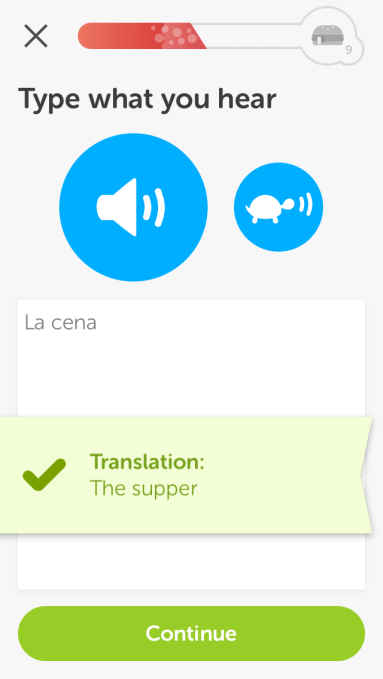Duolingo, the free language learning service co-founded by reCAPTCHA inventor Luis von Ahn, today announced that it has raised a $45 million investment round led by Google Capital. The company’s previous investors, which include the likes of Union Square Ventures, NEA and Kleiner Perkins Caufield & Byers, as well as Ashton Kutcher and Tim Ferris, also participated in this round. This round brings Duolingo’s total funding to date to $83.3 million and the company says its valuation is now around $470 million.
Duolingo says its free language learning tool currently has over 100 million users worldwide. More people are now using it to learn languages in the U.S. than in the entire public school system, the company claims. Over 100,000 teachers have also registered for the company’s free platform for schools.
 “Duolingo’s mobile-first, adaptive, and gamified platform is changing the way people are learning languages across the globe,” said Laela Sturdy, partner at Google Capital. “We were blown away by Duolingo’s growth and engagement numbers, and we’re thrilled to partner with them as they shape the future of education.”
“Duolingo’s mobile-first, adaptive, and gamified platform is changing the way people are learning languages across the globe,” said Laela Sturdy, partner at Google Capital. “We were blown away by Duolingo’s growth and engagement numbers, and we’re thrilled to partner with them as they shape the future of education.”
It’s worth noting that von Ahn already has a bit of history with Google. He sold reCAPTCHA to the company in 2009 and even before that, Google licensed his ESP Game to power the Google Image Labeler, which was online from 2006 to 2011.
The company says it will use the new funding to “make the platform even more adaptive, personalized and effective, and to expand the platform’s presence in schools across the globe.”
What Happened To Duolingo Translations?
It’s hard to build a business — let alone one valued at $470 million — by simply giving away free language learning classes, no matter how good they are. In its early days, Duolingo’s plan was to train people to the level where they can start translating more complex sentences as a part of the learning experience. Duolingo would then charge companies for these translation services. CNN, for example, has been using this for a while now.
Oddly enough, though, Duolingo did not mention any of this in its announcement today. A company spokesperson told me the company actually tabled its ambitions around translations about a year-and-a-half ago and hasn’t scaled the businesses or accepted new clients (it’s still working with CNN, though). Instead, the company is now using its Test Center certification program as a revenue source (the tests cost $20) and says that it has other plans to monetize.
“The reasoning for this was that, though we could make it a profitable business, we realized we’d quickly become a translations business as we’d have to hire people focused on quality control, sales people, etc. and eventually businesses tend to pay more attention to the parts of the company that are profitable,” a spokesperson told us.
“We are an education company and are here to help bring education to everyone in the world and to make education more effective.”






























Comment